北师版(2019) 选择性必修二 Unit 5 Education Lesson 1 Enlightening a Mind课件(共27张PPT)
文档属性
| 名称 | 北师版(2019) 选择性必修二 Unit 5 Education Lesson 1 Enlightening a Mind课件(共27张PPT) | 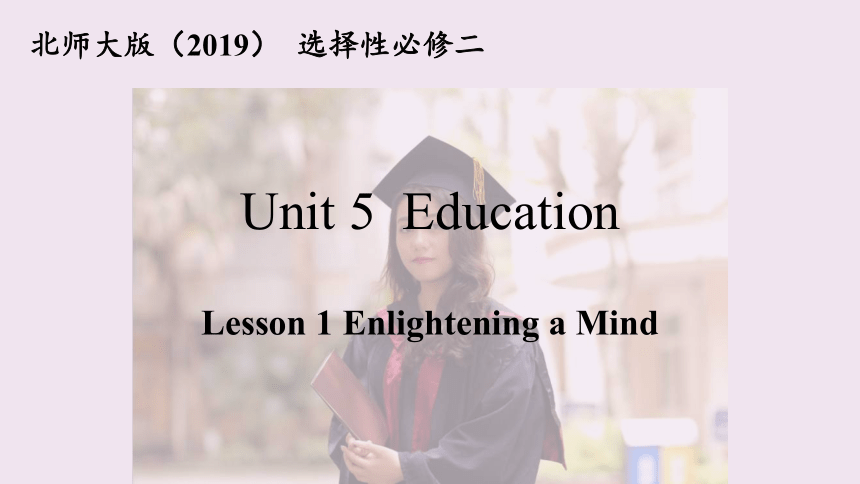 | |
| 格式 | pptx | ||
| 文件大小 | 27.2MB | ||
| 资源类型 | 教案 | ||
| 版本资源 | 北师大版(2019) | ||
| 科目 | 英语 | ||
| 更新时间 | 2023-08-20 15:05:33 | ||
图片预览

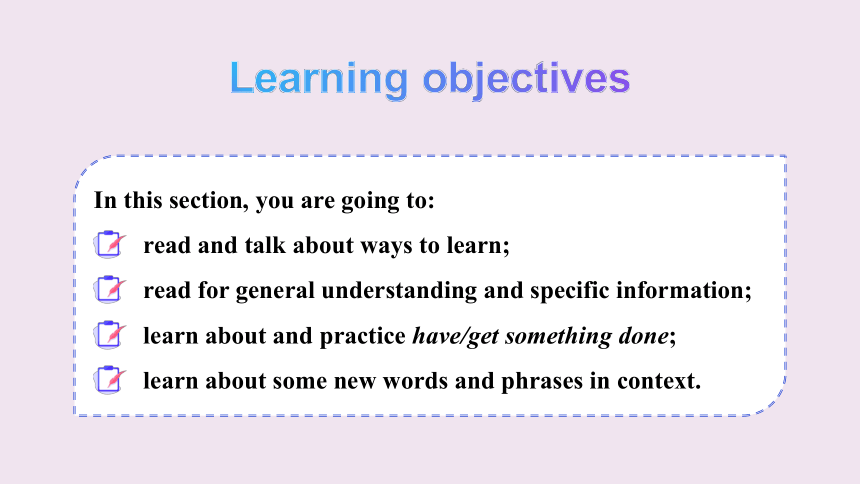

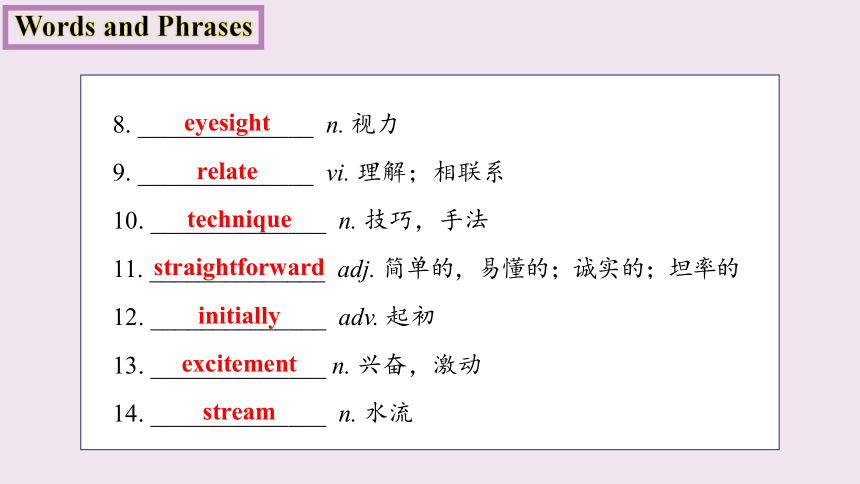
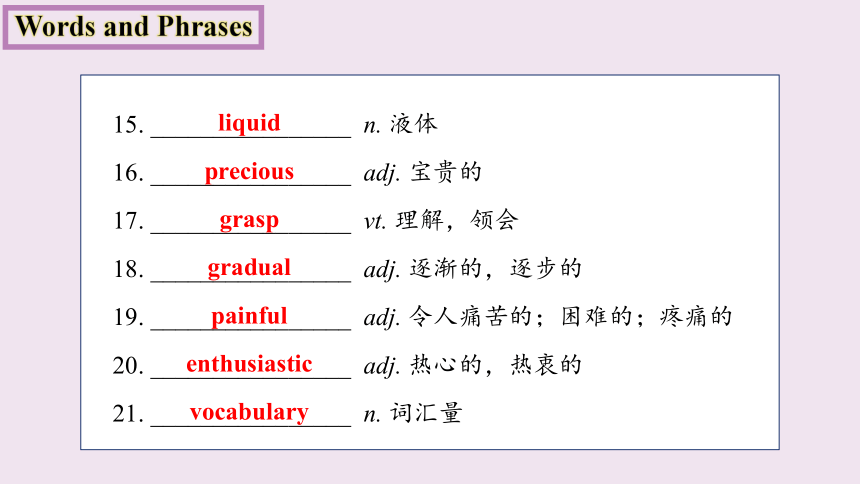
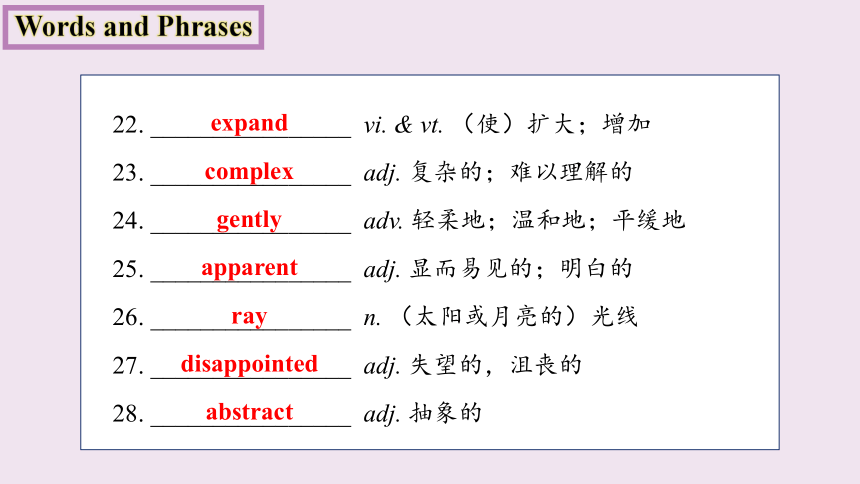
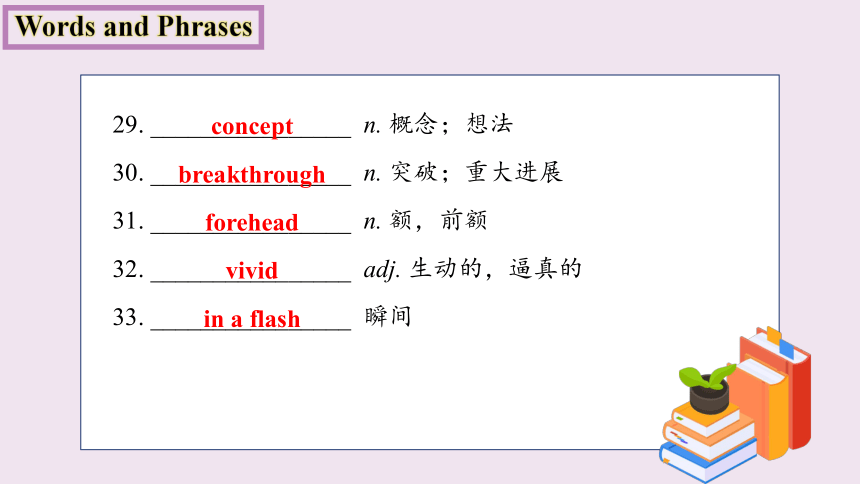
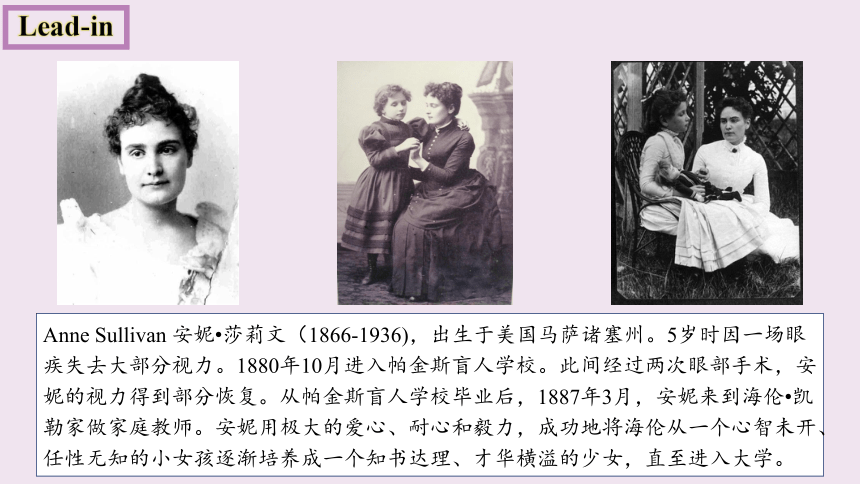
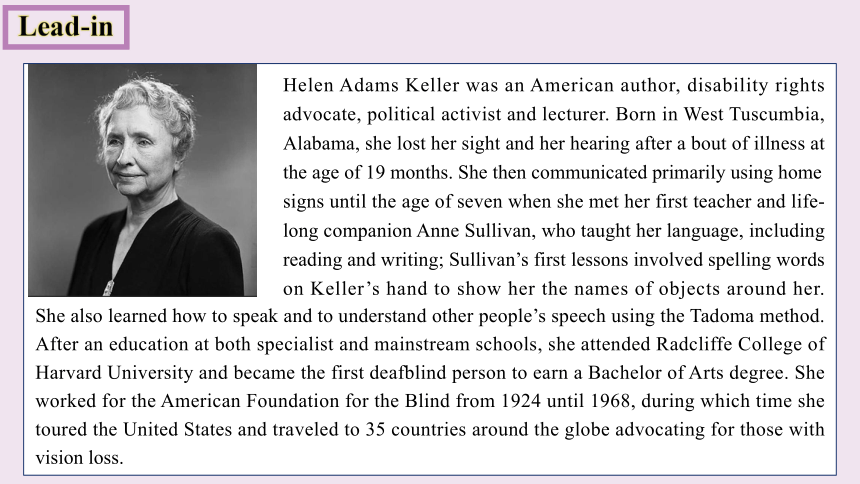
文档简介
(共27张PPT)
Unit 5 Education
Lesson 1 Enlightening a Mind
北师大版(2019) 选择性必修二
In this section, you are going to:
read and talk about ways to learn;
read for general understanding and specific information;
learn about and practice have/get something done;
learn about some new words and phrases in context.
Learning objectives
1. ______________ adv. 极其,非常
2. ______________ adj. 很严重的
3. ______________ n. 限制,规定,约束
4. ______________ adj. 难以忍受的;承受不住的
5. ______________ adj. 引起麻烦的;令人烦恼的
6. ______________ n. 倾向
7. ______________ adj. 极好的,卓越的
exceptionally
severe
restriction
unbearable
troublesome
tendency
superb
Words and Phrases
8. ______________ n. 视力
9. ______________ vi. 理解;相联系
10. ______________ n. 技巧,手法
11. ______________ adj. 简单的,易懂的;诚实的;坦率的
12. ______________ adv. 起初
13. ______________ n. 兴奋,激动
14. ______________ n. 水流
eyesight
relate
technique
straightforward
initially
excitement
stream
Words and Phrases
15. ________________ n. 液体
16. ________________ adj. 宝贵的
17. ________________ vt. 理解,领会
18. ________________ adj. 逐渐的,逐步的
19. ________________ adj. 令人痛苦的;困难的;疼痛的
20. ________________ adj. 热心的,热衷的
21. ________________ n. 词汇量
liquid
precious
grasp
gradual
painful
enthusiastic
vocabulary
Words and Phrases
22. ________________ vi. & vt. (使)扩大;增加
23. ________________ adj. 复杂的;难以理解的
24. ________________ adv. 轻柔地;温和地;平缓地
25. ________________ adj. 显而易见的;明白的
26. ________________ n. (太阳或月亮的)光线
27. ________________ adj. 失望的,沮丧的
28. ________________ adj. 抽象的
expand
complex
gently
apparent
ray
disappointed
abstract
Words and Phrases
29. ________________ n. 概念;想法
30. ________________ n. 突破;重大进展
31. ________________ n. 额,前额
32. ________________ adj. 生动的,逼真的
33. ________________ 瞬间
concept
breakthrough
forehead
vivid
in a flash
Words and Phrases
Lead-in
Anne Sullivan 安妮 莎莉文(1866-1936),出生于美国马萨诸塞州。5岁时因一场眼疾失去大部分视力。1880年10月进入帕金斯盲人学校。此间经过两次眼部手术,安妮的视力得到部分恢复。从帕金斯盲人学校毕业后,1887年3月,安妮来到海伦 凯勒家做家庭教师。安妮用极大的爱心、耐心和毅力,成功地将海伦从一个心智未开、任性无知的小女孩逐渐培养成一个知书达理、才华横溢的少女,直至进入大学。
Lead-in
Helen Adams Keller was an American author, disability rights advocate, political activist and lecturer. Born in West Tuscumbia, Alabama, she lost her sight and her hearing after a bout of illness at the age of 19 months. She then communicated primarily using home signs until the age of seven when she met her first teacher and life-long companion Anne Sullivan, who taught her language, including reading and writing; Sullivan’s first lessons involved spelling words on Keller’s hand to show her the names of objects around her.
She also learned how to speak and to understand other people’s speech using the Tadoma method. After an education at both specialist and mainstream schools, she attended Radcliffe College of Harvard University and became the first deafblind person to earn a Bachelor of Arts degree. She worked for the American Foundation for the Blind from 1924 until 1968, during which time she toured the United States and traveled to 35 countries around the globe advocating for those with vision loss.
Before reading
1. Think of some possible ways to teach someone who is blind to read and write. Then think of ways to teach someone who is both blind and deaf to read and write.
2. How much more difficult would it be to teach someone who is both blind and deaf to read and write
Read paragraphs 1-2 of the story. Discuss Helen Keller and her teacher’s characteristics and personalities.
Helen was frustrated, stubborn and troublesome. She got angry easily when she was not understood.
Anne was a superb teacher who could understand Helen’s difficulties. She was sympathetic.
While reading
Read the rest of the story. Answer the questions.
1. How many words were taught to Helen What were they
Four words were taught to Helen in the story: “doll”, “water”, “love” and “think”.
2. Which words were easier to learn Which were more difficult Explain why.
The words “doll” and “water” were easier to learn, because Helen could touch them. The words “love” and “think” were more difficult, because they were complex and abstract concept and couldn’t be touched.
While reading
While reading
Complete the diagram.
How Anne taught Helen the four words
1
2
3
4
For the word “doll”
Anne_________________________________________________________________.
let Helen play with the doll, and then spelt the letters “D-O-L-L” on her hand
For the word “water”
Anne __________________________ ________________________________
________________________________________________________.
put one of Helen’s hands under the water. As the water flowed over Helen’s hand, Anne spelt out “W-A-T-E-R” into Helen’s other hand
For the word “think”
When Helen was trying to solve a difficult problem, Anne_____________ ________________________________________. In a flash, Helen__________ _________________________________________________________.
forehead and wrote the word “think” on her hand
knew that the word was the name of the process that was going on in her head
touched Helen’s
For the word “love”
Helen thought at first it was the sweetness of flowers but later ________ ____________________________________________________. “You cannot touch love _______________________ _______________________________________________________________.”
but you feel the sweetness that it pours into everything. Without love you would not be happy or want to play
Anne drew Helen closer to her and said, “It is here”, pointing to Helen’s heart
a felt hope and joy
b felt puzzled
c had a breakthrough
d thought it was a game
e got the world of words opened up to her
f understood the beautiful truth of the word
g knew the meaning of the word in a flash
h felt it was monkey-like imitation
Complete the diagram about how the learning process affected Helen by choosing from the expressions.
doll water love think
had a burst of understanding felt confused and disappointed
a felt hope and joy
e got the world of words opened up to her
d thought it was a game
h felt it was monkey-like imitation
b felt puzzled
f understood the beautiful truth of the word
c had a breakthrough
g knew the meaning of the word in a flash
After reading
After reading
Each member chooses one word. Tell the rest of the group how Anne taught the word and what impact the learning process had on Helen.
How many parts can the story be divided into What is each part mainly about Underline the signal expressions that connect the description of Helen’s learning processes.
What qualities do you think Helen and Anne showed in the story Choose from the list below. Find evidence to support your opinion.
I think that Helen was determined to try to understand a word. She kept asking Anne questions so that she could understand the word “think”.
I think Anne was perseverant, patient and creative because she kept trying different ways and waiting for Helen to discover what words are.
After reading
determined perseverant kind patient diligent willing creative
Fill in the blanks with the words from the story.
When Helen was young she lost her sight and hearing. With these 1 to her communication, Helen’s behaviour was often 2 and sometimes she was 3 , stubborn and angry with a 4 to break things when she was not understood. Anne Sullivan was a 5 teacher. Anne’s technique was simple and 6 . She put an object into Helen’s hand and spelt out the word on her other hand. The 7 knowledge she taught Helen gave her hope and joy. From “doll” and “water”, Helen’s knowledge and 8 expanded and this changed her 9 process. As Helen grasped the key to language, she discovered more 10 words. Helen now understood the beautiful truth of the word “love”.
severe restrictions
After reading
unbearable
troublesome
tendency
complex
superb
straightforward
precious
vocabulary
thinking
Find a sentence or part of a sentence in the text which uses have / get something done and means the following:
1. She could not do anything for herself.
have everything done for her
2. A great teacher was suggested to Helen’s parents.
got a superb teacher recommended
3. A new world of language opened up to her.
got the world of words opened up to her
After reading
EXPRESS YOURSELF
Write down questions that you would want to ask Anne Sullivan. Then act out a role-play of the interview between you and Anne.
After reading
Have / get something done
Have / get something done 结构
We use the structure have / get something done when we want to say that we ask someone else to do something for us.
have/get something done 结构用来表达要别人为自己做某事。
比较下列句子:
I fixed the washing machine. (I did it myself.)
I had my washing machine fixed. (I asked someone to fix it for me.)
He repaired the roof. (He did it himself.)
He got the roof repaired. (He asked someone to repair it for him.)
Grammar
Tense Have / get something done
Present Simple 一般现在时 I have / get my hair cut.
Past Simple 一般过去时 I had / got my hair cut.
Present Continuous 现在进行时 I’m having / getting my hair cut.
Past Continuous 过去进行时 I was having / getting my hair cut.
Present Perfect 现在完成时 I’ve had / got my hair cut.
Past Perfect 过去完成时 I had had / got my hair cut.
Simple Future 一般将来时 I will have / get my hair cut.
I’m going to have / get my hair cut.
Grammar
Complete the sentences using have / get something done and the cues in the brackets.
1. We’re going to (a video of the wedding / make) have a video of the wedding made.
2. I don’t know what’s wrong with my tyres. I’ll (them / check) .
3. I’ll (the washing machine / repair) soon.
4. Many years ago Pauline (portrait / paint) by a well-known painter.
5. (you ever / voice / record)
6. (you / face / make up) with face paint when you were a kid
had a portrait painted
have them checked
have the washing machine repaired
Have you ever had your face made-up
Have you ever had your voice recorded
Exercises
根据中英文提示,完成下列句子。
1. 我妈妈的钱包在公交车上被偷了。
My mother ________________________ on the bus.
2. 他从树上掉下来,左胳膊骨折了。
He fell from a tree and ________ his left arm ____________.
3. 我将在下午6点之前完成我的工作。
I _______________ my job ________ before six o’clock this afternoon.
4. 这个病人准备让人给他量体温。
The patient is going to _______ his temperature _____________.
5. Mary最近非常忙,她正在装修她的房子。
Mary is very busy these days. She ____________ her house _____________.
had / got her wallet stolen
broken
finished
had
Exercises
will have / get
have
measured
redecorated
is getting
Language points
1. Now that Helen grasped the key to language, she was very eager to learn more and use it as much as she could.
由于海伦理解了语言的关键,她非常渴望学习更多语言,并且尽可能运用它。
be eager to do sth 渴望做某事
【例句】
① We are eager to come here. 我们热切盼望来到这里。
② He was eager to get into politics. 他渴望进入政界。
③ Robert was eager to talk about life in the Army. 罗伯特很想谈谈陆军生活。
④ Our company is eager to expand into new markets.
我们公司急欲开辟新的市场。
⑤ As soon as we arrived on the island we were eager to explore.
我们一来到岛上就急不可耐地开始探险。
2. She was making necklaces with the help of Anne when she noticed that she had made some mistakes.
她正在安妮的帮助下做项链,这时她发现自己犯了一些错。
with the help of 在……的帮助下
【例句】
① He made himself understood with the help of gestures.
他用手势让人们了解他的意思。
② With the help of his teacher, he made rapid progress in mathematics.
在老师的帮助下,他的数学成绩进步飞快。
③ With the help of the Chinese dockers, the foreign seaman got back the watch he had lost.
在中国码头工人的帮助下,那个外国海员找回了他丢失的手表。
Language points
3. In a flash I knew that the word was the name of the process that was going on in my head.
瞬间我就明白了,我头脑中进行的活动就是这个词的意思。
in a flash 瞬间
【例句】
① Wait here and I’ll be back in a flash. 在这等着,我马上回来。
② The answer had come to him in a flash. 他一下子就有了答案。
③ The ceremony was over in a flash. 典礼很快就结束了。
④ Five years have elapsed in a flash. 一晃就是5年。
⑤ I’ll have this report typed up in a flash! 我马上就把这份报告打印出来!
⑥ Just call us on this number if you have any problems, and we’ll be back in a flash. 如果你有任何问题,打这个电话给我们,我们马上就回来。
Language points
Thank you
Unit 5 Education
Lesson 1 Enlightening a Mind
北师大版(2019) 选择性必修二
In this section, you are going to:
read and talk about ways to learn;
read for general understanding and specific information;
learn about and practice have/get something done;
learn about some new words and phrases in context.
Learning objectives
1. ______________ adv. 极其,非常
2. ______________ adj. 很严重的
3. ______________ n. 限制,规定,约束
4. ______________ adj. 难以忍受的;承受不住的
5. ______________ adj. 引起麻烦的;令人烦恼的
6. ______________ n. 倾向
7. ______________ adj. 极好的,卓越的
exceptionally
severe
restriction
unbearable
troublesome
tendency
superb
Words and Phrases
8. ______________ n. 视力
9. ______________ vi. 理解;相联系
10. ______________ n. 技巧,手法
11. ______________ adj. 简单的,易懂的;诚实的;坦率的
12. ______________ adv. 起初
13. ______________ n. 兴奋,激动
14. ______________ n. 水流
eyesight
relate
technique
straightforward
initially
excitement
stream
Words and Phrases
15. ________________ n. 液体
16. ________________ adj. 宝贵的
17. ________________ vt. 理解,领会
18. ________________ adj. 逐渐的,逐步的
19. ________________ adj. 令人痛苦的;困难的;疼痛的
20. ________________ adj. 热心的,热衷的
21. ________________ n. 词汇量
liquid
precious
grasp
gradual
painful
enthusiastic
vocabulary
Words and Phrases
22. ________________ vi. & vt. (使)扩大;增加
23. ________________ adj. 复杂的;难以理解的
24. ________________ adv. 轻柔地;温和地;平缓地
25. ________________ adj. 显而易见的;明白的
26. ________________ n. (太阳或月亮的)光线
27. ________________ adj. 失望的,沮丧的
28. ________________ adj. 抽象的
expand
complex
gently
apparent
ray
disappointed
abstract
Words and Phrases
29. ________________ n. 概念;想法
30. ________________ n. 突破;重大进展
31. ________________ n. 额,前额
32. ________________ adj. 生动的,逼真的
33. ________________ 瞬间
concept
breakthrough
forehead
vivid
in a flash
Words and Phrases
Lead-in
Anne Sullivan 安妮 莎莉文(1866-1936),出生于美国马萨诸塞州。5岁时因一场眼疾失去大部分视力。1880年10月进入帕金斯盲人学校。此间经过两次眼部手术,安妮的视力得到部分恢复。从帕金斯盲人学校毕业后,1887年3月,安妮来到海伦 凯勒家做家庭教师。安妮用极大的爱心、耐心和毅力,成功地将海伦从一个心智未开、任性无知的小女孩逐渐培养成一个知书达理、才华横溢的少女,直至进入大学。
Lead-in
Helen Adams Keller was an American author, disability rights advocate, political activist and lecturer. Born in West Tuscumbia, Alabama, she lost her sight and her hearing after a bout of illness at the age of 19 months. She then communicated primarily using home signs until the age of seven when she met her first teacher and life-long companion Anne Sullivan, who taught her language, including reading and writing; Sullivan’s first lessons involved spelling words on Keller’s hand to show her the names of objects around her.
She also learned how to speak and to understand other people’s speech using the Tadoma method. After an education at both specialist and mainstream schools, she attended Radcliffe College of Harvard University and became the first deafblind person to earn a Bachelor of Arts degree. She worked for the American Foundation for the Blind from 1924 until 1968, during which time she toured the United States and traveled to 35 countries around the globe advocating for those with vision loss.
Before reading
1. Think of some possible ways to teach someone who is blind to read and write. Then think of ways to teach someone who is both blind and deaf to read and write.
2. How much more difficult would it be to teach someone who is both blind and deaf to read and write
Read paragraphs 1-2 of the story. Discuss Helen Keller and her teacher’s characteristics and personalities.
Helen was frustrated, stubborn and troublesome. She got angry easily when she was not understood.
Anne was a superb teacher who could understand Helen’s difficulties. She was sympathetic.
While reading
Read the rest of the story. Answer the questions.
1. How many words were taught to Helen What were they
Four words were taught to Helen in the story: “doll”, “water”, “love” and “think”.
2. Which words were easier to learn Which were more difficult Explain why.
The words “doll” and “water” were easier to learn, because Helen could touch them. The words “love” and “think” were more difficult, because they were complex and abstract concept and couldn’t be touched.
While reading
While reading
Complete the diagram.
How Anne taught Helen the four words
1
2
3
4
For the word “doll”
Anne_________________________________________________________________.
let Helen play with the doll, and then spelt the letters “D-O-L-L” on her hand
For the word “water”
Anne __________________________ ________________________________
________________________________________________________.
put one of Helen’s hands under the water. As the water flowed over Helen’s hand, Anne spelt out “W-A-T-E-R” into Helen’s other hand
For the word “think”
When Helen was trying to solve a difficult problem, Anne_____________ ________________________________________. In a flash, Helen__________ _________________________________________________________.
forehead and wrote the word “think” on her hand
knew that the word was the name of the process that was going on in her head
touched Helen’s
For the word “love”
Helen thought at first it was the sweetness of flowers but later ________ ____________________________________________________. “You cannot touch love _______________________ _______________________________________________________________.”
but you feel the sweetness that it pours into everything. Without love you would not be happy or want to play
Anne drew Helen closer to her and said, “It is here”, pointing to Helen’s heart
a felt hope and joy
b felt puzzled
c had a breakthrough
d thought it was a game
e got the world of words opened up to her
f understood the beautiful truth of the word
g knew the meaning of the word in a flash
h felt it was monkey-like imitation
Complete the diagram about how the learning process affected Helen by choosing from the expressions.
doll water love think
had a burst of understanding felt confused and disappointed
a felt hope and joy
e got the world of words opened up to her
d thought it was a game
h felt it was monkey-like imitation
b felt puzzled
f understood the beautiful truth of the word
c had a breakthrough
g knew the meaning of the word in a flash
After reading
After reading
Each member chooses one word. Tell the rest of the group how Anne taught the word and what impact the learning process had on Helen.
How many parts can the story be divided into What is each part mainly about Underline the signal expressions that connect the description of Helen’s learning processes.
What qualities do you think Helen and Anne showed in the story Choose from the list below. Find evidence to support your opinion.
I think that Helen was determined to try to understand a word. She kept asking Anne questions so that she could understand the word “think”.
I think Anne was perseverant, patient and creative because she kept trying different ways and waiting for Helen to discover what words are.
After reading
determined perseverant kind patient diligent willing creative
Fill in the blanks with the words from the story.
When Helen was young she lost her sight and hearing. With these 1 to her communication, Helen’s behaviour was often 2 and sometimes she was 3 , stubborn and angry with a 4 to break things when she was not understood. Anne Sullivan was a 5 teacher. Anne’s technique was simple and 6 . She put an object into Helen’s hand and spelt out the word on her other hand. The 7 knowledge she taught Helen gave her hope and joy. From “doll” and “water”, Helen’s knowledge and 8 expanded and this changed her 9 process. As Helen grasped the key to language, she discovered more 10 words. Helen now understood the beautiful truth of the word “love”.
severe restrictions
After reading
unbearable
troublesome
tendency
complex
superb
straightforward
precious
vocabulary
thinking
Find a sentence or part of a sentence in the text which uses have / get something done and means the following:
1. She could not do anything for herself.
have everything done for her
2. A great teacher was suggested to Helen’s parents.
got a superb teacher recommended
3. A new world of language opened up to her.
got the world of words opened up to her
After reading
EXPRESS YOURSELF
Write down questions that you would want to ask Anne Sullivan. Then act out a role-play of the interview between you and Anne.
After reading
Have / get something done
Have / get something done 结构
We use the structure have / get something done when we want to say that we ask someone else to do something for us.
have/get something done 结构用来表达要别人为自己做某事。
比较下列句子:
I fixed the washing machine. (I did it myself.)
I had my washing machine fixed. (I asked someone to fix it for me.)
He repaired the roof. (He did it himself.)
He got the roof repaired. (He asked someone to repair it for him.)
Grammar
Tense Have / get something done
Present Simple 一般现在时 I have / get my hair cut.
Past Simple 一般过去时 I had / got my hair cut.
Present Continuous 现在进行时 I’m having / getting my hair cut.
Past Continuous 过去进行时 I was having / getting my hair cut.
Present Perfect 现在完成时 I’ve had / got my hair cut.
Past Perfect 过去完成时 I had had / got my hair cut.
Simple Future 一般将来时 I will have / get my hair cut.
I’m going to have / get my hair cut.
Grammar
Complete the sentences using have / get something done and the cues in the brackets.
1. We’re going to (a video of the wedding / make) have a video of the wedding made.
2. I don’t know what’s wrong with my tyres. I’ll (them / check) .
3. I’ll (the washing machine / repair) soon.
4. Many years ago Pauline (portrait / paint) by a well-known painter.
5. (you ever / voice / record)
6. (you / face / make up) with face paint when you were a kid
had a portrait painted
have them checked
have the washing machine repaired
Have you ever had your face made-up
Have you ever had your voice recorded
Exercises
根据中英文提示,完成下列句子。
1. 我妈妈的钱包在公交车上被偷了。
My mother ________________________ on the bus.
2. 他从树上掉下来,左胳膊骨折了。
He fell from a tree and ________ his left arm ____________.
3. 我将在下午6点之前完成我的工作。
I _______________ my job ________ before six o’clock this afternoon.
4. 这个病人准备让人给他量体温。
The patient is going to _______ his temperature _____________.
5. Mary最近非常忙,她正在装修她的房子。
Mary is very busy these days. She ____________ her house _____________.
had / got her wallet stolen
broken
finished
had
Exercises
will have / get
have
measured
redecorated
is getting
Language points
1. Now that Helen grasped the key to language, she was very eager to learn more and use it as much as she could.
由于海伦理解了语言的关键,她非常渴望学习更多语言,并且尽可能运用它。
be eager to do sth 渴望做某事
【例句】
① We are eager to come here. 我们热切盼望来到这里。
② He was eager to get into politics. 他渴望进入政界。
③ Robert was eager to talk about life in the Army. 罗伯特很想谈谈陆军生活。
④ Our company is eager to expand into new markets.
我们公司急欲开辟新的市场。
⑤ As soon as we arrived on the island we were eager to explore.
我们一来到岛上就急不可耐地开始探险。
2. She was making necklaces with the help of Anne when she noticed that she had made some mistakes.
她正在安妮的帮助下做项链,这时她发现自己犯了一些错。
with the help of 在……的帮助下
【例句】
① He made himself understood with the help of gestures.
他用手势让人们了解他的意思。
② With the help of his teacher, he made rapid progress in mathematics.
在老师的帮助下,他的数学成绩进步飞快。
③ With the help of the Chinese dockers, the foreign seaman got back the watch he had lost.
在中国码头工人的帮助下,那个外国海员找回了他丢失的手表。
Language points
3. In a flash I knew that the word was the name of the process that was going on in my head.
瞬间我就明白了,我头脑中进行的活动就是这个词的意思。
in a flash 瞬间
【例句】
① Wait here and I’ll be back in a flash. 在这等着,我马上回来。
② The answer had come to him in a flash. 他一下子就有了答案。
③ The ceremony was over in a flash. 典礼很快就结束了。
④ Five years have elapsed in a flash. 一晃就是5年。
⑤ I’ll have this report typed up in a flash! 我马上就把这份报告打印出来!
⑥ Just call us on this number if you have any problems, and we’ll be back in a flash. 如果你有任何问题,打这个电话给我们,我们马上就回来。
Language points
Thank you
同课章节目录
- Unit 4 Humour
- Lesson 1 What’s So Funny?
- Lesson 2 Why Do We Need Humour?
- Lesson 3 My Favourite Comedian
- Unit 5 Education
- Lesson 1 Enlightening a Mind
- Lesson 2 The Objectives of Education
- Lesson 3 Understanding
- Unit 6 The Media
- Lesson 1 From Page to Screen
- Lesson 2 Questions about Media
- Lesson 3 The Advertising Game
